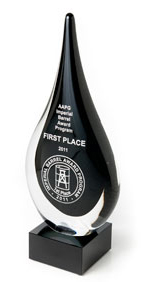Texas Team Wins 2011 Imperial Barrel Award Competition
April 14, 2011

A team of geoscience students from The University of Texas at Austin beat finalists from 11 global regions to win the Imperial Barrel Award, the world’s largest and most prestigious competition in petroleum geosciences hosted annually by the American Association of Petroleum Geologists (AAPG).
The team of students from the university’s Jackson School of Geosciences-Ashley Bens, Michael Fairbanks, Justin Fitch, Erin Miller and Ben Siks-won $20,000 for their AAPG student chapter.
The University of Southhampton from the United Kingdom took second place and Sultan Qaboos University from Oman was third.
Starting in regional competitions, 87 university teams competed for the Imperial Barrel Award. Students use industry technology and datasets to seek a solution to an energy geoscience problem, presenting their findings to a panel of judges from the energy industry. The panel selects the winning team based on the technical quality, clarity and originality of its presentation.
“From an employability perspective, the five students who won went from strong contenders to the top of the class on every petroleum recruiter’s list,” said Chris Zahm, a research associate at the Jackson School and faculty adviser for the team. “This is the top line of their resume.”
“I’m so proud of the students and their adviser,” said Sharon Mosher, dean of the Jackson School. “Witnessing what these students have just accomplished, the future looks very bright.”
AAPG started the Imperial Barrel Award program in 2007, based on a similar competition at Imperial College, to give students an opportunity to experience the team-oriented creative process and evolving technology of the energy industry.

More Information
Each spring, Chris Zahm teaches the course “Petroleum Basin Evaluation.” The five students selected to participate in the IBA competition were voted the best candidates by the entire class. When students start the class, they have little to no experience working with well logs and geophysical data.
“I find the teaching experience to be very gratifying because I get to see the students go through an important phase change in their learning-evolving from a student of geology to one that comprehends the impact of their study to the world economic stage,” said Zahm.
Zahm, who worked at ConocoPhillips on an exploration portfolio analysis team doing essentially the same thing as these students before coming to the university, has taught the class for three years. In 2009 and 2010, his teams won second place in the regional round of the IBA competition.

In this global competition, university teams analyze a dataset (geology, geophysics, land, economics, production infrastructure, and other relevant materials) in the eight weeks prior to their local competition. Each team delivers their results in a 25 minute presentation to a panel of industry experts. Students have the chance to use real technology on a real dataset, receive the feedback from an industry panel, have the opportunity to impress potential employers in the audience, and the chance to win cash awards for their schools. The industry panel of judges selects the winning team on the basis of the technical quality, clarity and originality of its presentation.
The winners of the 12 regional competitions advance to the global competition. With one additional week to prepare, the students make a 25 minute presentation to the final panel of judges. Then they engage in a 15 minute question and answer session.
“I followed up with the judging panel after the competition was over and determined that the first and second place team presentations were of similar quality, but the Q and A portion strongly favored the UT team,” said Zahm.
Also See:
Imperial Barrel Award Program
For more information on the Jackson School, contact J.B. Bird at jbird@jsg.utexas.edu, 512-232-9623.
